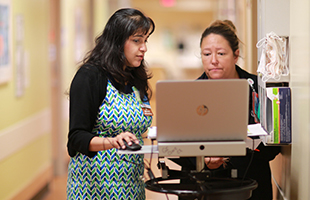Newer Horizons in Treating Functional Gastrointestinal Disorders

Difficult to diagnose and challenging to treat, functional gastrointestinal disorders (FGIDs) pose unique challenges in the clinical setting. A new pain-related FGID clinic at Cincinnati Children’s offers comprehensive care for children with these conditions, including treatment options such as medication, cognitive behavioral therapy and neuromodulation.
The clinic, led by pediatric gastroenterologist Neha Santucci, MD, currently takes place once a month, with the goal of providing each patient with an accurate diagnosis and treatment options, including a plan for long-term follow-up. “Adolescents often are disabled by their functional abdominal pain, and conventional medications can fail to relieve suffering,” says Santucci. “We provide an interdisciplinary, biopsychosocial approach, and tailor treatment according to individual patient needs.”
Newer therapies
Cincinnati Children’s began offering neuromodulation therapy for pain, nausea and vomiting associated with FGIDs last year. The therapy is delivered via a non-invasive electroauricular device (EAD).
“We are trying to understand who benefits from EAD therapy and why,” says pediatric gastroenterologist Khalil El-Chammas, MD, MS, who is working with two other centers on a multicenter prospective registry to better understand EAD outcomes in patients with FGIDs. “It is a work in progress, and we believe this therapy has great potential not only for kids with FGIDs, but those with other pain disorders, such as migraine.”
Overall program growth
The clinic is part of the hospital’s growing Neurogastroenterology and Motility Disorders Center, which provides comprehensive care for patients with motility issues related to problems such as dysphagia, achalasia, feeding disorders, esophageal dysmotility, gastroparesis, pseudo-obstruction, idiopathic constipation and Hirschsprung's disease. Patient volume within this center has more than doubled in the last five years, with referrals on the rise across all diagnoses.
“Our program’s interdisciplinary approach, coupled with our introduction of new technology as soon as it becomes available, allows the team to provide comprehensive, innovative care for patients with complex needs,” says Ajay Kaul, MD, a pediatric gastroenterologist and director of the Neurogastroenterology and Motility Disorders Center.
Research partnerships
Kaul and his colleagues recently collaborated with the Neurology Division’s Comprehensive Neuromuscular Center to publish two studies related to the prevalence of constipation and segmental GI transit times in children with Duchenne Muscular Dystrophy (DMD). Researchers within the Division of Pathology and Laboratory Medicine at Cincinnati Children’s studied the expression of dystrophin and urotrophin in the smooth muscle of the GI tract of children with DMD. They found that constipation was grossly underestimated in this population and, contrary to popular belief, GI transit was normal in children with DMD.
The researchers also showed an abnormal expression of dystrophin and urotrophin in smooth muscle of a DMD patient. Despite the abnormal distribution of these proteins, the gut transit was normal, suggesting that the constipation in DMD was of the ‘normal transit’ type. Studies like this that involve collaboration with researchers in other divisions are opening up new avenues for motility-related research, Kaul says.



